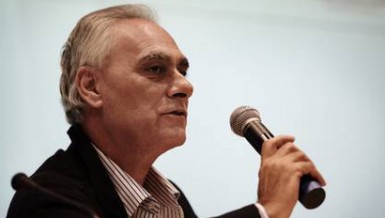
By James M. Dorsey
President Mohamed Morsi and his flailing Muslim Brotherhood have turned to foreign policy and soccer to improve their battered image in advance of a planned mass anti-government protest at the end of this month and mounting calls for his resignation.
In a bid to distract attention from his domestic woes, curry favour with the United States and Gulf countries and restore Egypt to a leadership position in the Middle East and North Africa, Mr Morsi chose a Cairo stadium to announce to his rallied supporters that he was cutting diplomatic ties with the regime of embattled Syrian President Bashar Al-Assad.
The president’s ruling Brotherhood at the same time said it would field candidates for the board elections of storied Cairo soccer club Al Zamalek SC and other major football teams. The move is an effort to gain control of clubs in a football-crazy country whose huge fan base played a key political role in and since the toppling of Hosni Mubarak two years ago.
The fans, one of the largest civic groups in Egypt, are likely to participate in a mass opposition Tamarod (Rebellion) march on the presidential palace scheduled for 30 June, the first anniversary of Mr Morsi’s inauguration as Egypt’s first freely-elected post-revolution leader, to demand his resignation and early elections. Egyptian media report that a petition calling for his resignation is said to have so far attracted 15 million signatures, two million more than the 13 million votes the president garnered a year ago. A significant number of militant football fans are believed to be among the signatories.
Criticism of Mr Morsi has mounted in the past year as a result of his failure to halt Egypt’s stark economic decline, his haughty leadership style that many believe harks back to Mr. Mubarak’s authoritarianism and his perceived efforts to Islamise Egyptian society.
Militant football fans have in the last year played a key role in protests against Mr Morsi. The conviction to death of football fans and perceived leniency towards security personnel in a trial earlier this year against those responsible for the death last year of 74 fans in Port Said sparked a popular uprising in Suez Canal cities and violent protests in Cairo.
Egyptian artists, writers, and intellectuals camped out in front of the culture ministry in Cairo to demand the resignation of Minister Alaa Abdel-Aziz because of his alleged efforts to force the arts to conform to Islamic conservatism called last week on the militant football fans to protect them against attacks by supporters of Mr Morsi.
The Brotherhood’s intention to increase its influence in football clubs, many of which are financially troubled as the result of long suspensions sparked by Egypt’s political turmoil since 2011, is the movement’s latest effort to come to grips with the country’s most popular pastime. Brotherhood officials initially toyed in 2011 with the creation of their own football clubs but then opted for a promise to clean the sport of corruption.
While Mr Morsi’s breaking off of relations with Syria strikes a popular cord among Egyptians who are largely abhorred by Mr Al-Assad’s crackdown, his attempt to control soccer clubs risks backfiring.
Islamists hardly endeared themselves to fans by recently suggesting that their rivalries were a Zionist plot to destabilise Egypt. Al-Hafez TV, a Salafi television station critical of Morsi that promotes a return to the 7th century lifestyle of the Prophet Muhammad and his immediate successors, made this very insinuation by airing a video portraying an alleged ultra-Orthodox Jew as advocating the instigation of strife between various groups in Egypt, including soccer fans.
James M. Dorsey is a senior fellow at the S. Rajaratnam School of International Studies, co-director of the University of Würzburg’s Institute of Fan Culture, and the author of The Turbulent World of Middle East Soccer blog.




